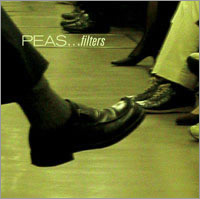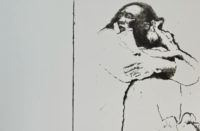::..:::…..:..::….:::::..:::..:::::::……:::…::.:::….::::..:..:::…::…….:::::
V/A :: Reinterpretations (Kanpai, CD)

Domo Records, home of legendary sonic artist Kitaro,
recently launched the Kanpai Records imprint to focus
on electronic and non-genre specific hybrids. One of
the first releases on Kanpai is the Reinterpretations
compilation, inspired by the works of Kitaro and
featuring an assortment of remixers, DJs and producers
each lending their talents and impressions true to the
label’s hybrid intent. As the title implies, these
are not merely remixes, nor are they so-called
“covers,” these pieces are meant to illustrate that
Kitaro’s vast 30 year-plus catalogue of timeless
recordings, often referred to as “Sound Pictures,”
lend themselves well to reinvention in current
electronica climates flirting with subtle contemporary
to full-on experimental.
“Michi”, the lead track off of last year’s The Sacred
Journey of Ku-kai, gets disassembled and
reconstructed by Junior Senior bassist Filip Nikolic
in his solo guise as Turbotito with lush spacey echo
effects and heavy bass conversing with its bright
digital melodies. The production team known as Inside
The Sun plunge deep into 3 of Kitaro’s works,
beginning with his signature piece “Theme From Silk
Road,” featuring laid-back drum loops reverently
unfolding over the delicate representation of the
ancient road from Europe to China. The drums take on
an organic quality in their interplay with the mystic
sounds of “Shizuku,” also from Sacred Journey of
Ku-kai. Inside The Sun outdo themselves with their
reinterpretation of “Mercury” from 2000’s Thinking Of
You, with tribal rhythms complementing a haunting
flute solo that evokes images of a busy metropolis
encroaching on a brooding countryside.
“Sitara IV” from 2002’s An Ancient Journey is
transformed into “Beat Break” by DJ Peas, who gives
the Middle-eastern flavored track as well as its smoky
companion, “Low Pass Dub” the Planet Dog dub
treatment. Both tracks are a mere taste of what Peas
has cooked on his impressive album Filters, where he
sampled Kitaro’s music on each track.
Reinterpretations closes with Stephen Hauptfeur’s
reworking of Sacred Journey of Ku-kai‘s closing track,
“Cocoro.” Where the original version was an accurate
interpretation of traditional Japanese music, the
reinterpretation morphs it into an experimental piece
with broken piano loops and disjointed chords
disturbing the peaceful choral intro.
My only kvetch with Reinterpretations is minor; with
the bulk of the material originally appearing on
Sacred Journey of Ku-kai, I’m left wondering if the
1986 classic Tenku was intentionally overlooked, or if
the producers felt its worthy material has remained
timeless in the years since it was released and was
free from the need to be reinterpreted. Regardless,
this is not “just another tired remix album,” it’s
refreshing to see a respected artist such as Kitaro
exposed to new listeners in this context.
::..:::…..:..::….:::::..:::..:::::::……:::…::.:::….::::..:..:::…::…….:::::
Peas :: Filters (Kanpai, CD)

After working on co-scoring the 13 episode Japanese
anime Ninja Scroll with electronic legend Kitaro,
L.A. based DJ/producer Peter Peas McEvilley decided
to record a new album where each track would sample
Kitaro’s music. The end result is Filters, a
chilled-out downtempo electronica masterpiece that has
already found success on iTunes, as well as one of its
tracks, “Beat Break” being featured in an episode of
the popular TV show C.S.I. and, along with “Low Pass
Dub” on the Reinterpretations compilation. While this
concept has been attempted before with mixed results,
Peas offers an original perspective in his techniques
applied as he (hence the title) filters Kitaro.
Over the course of Filters‘ 14 tracks, Peas
effortlessly manipulates his source material into an
attractive sound sculpture with various types of beats
and heavily processed vocals suitable for public
display and equally pleasing to the ears. From the
coffee table house of “Looks Like Heaven” to the
Chemical Brothers-like “Certifiable” and sultry lounge
of “Don’t Be Lonely,” it becomes obvious Peas is a
master at translating his DJ performance skills into
his studio experiments, resulting in less temptation
to skip tracks and relish the experience.
The beats keep coming with the funky “Never Stop the
Music” and “Many Might Try and Get Ya” all the way to
the understated closer “Oil, Air,” all the while in
the background Kitaro’s worldly music flows seamlessly
into the upfront grooves that identify Filters‘ charm. This album will definitely appeal to those who have
some Kruder & Dorfmeister or Thievery Corporation
albums lurking in their collections, and I’m sure it
won’t be the last we hear from Peas.
::..:::…..:..::….:::::..:::..:::::::……:::…::.:::….::::..:..:::…::…….:::::
Filters and Reinterpretations are out now on Kanpai Records.






















